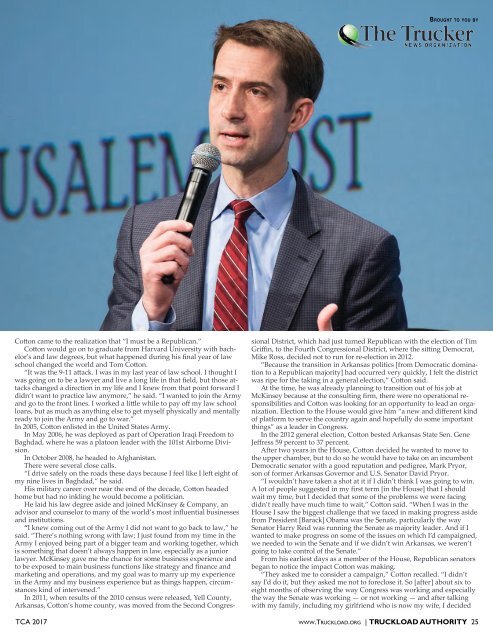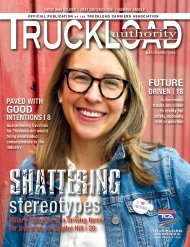TLA25_AllPages_R
Create successful ePaper yourself
Turn your PDF publications into a flip-book with our unique Google optimized e-Paper software.
Brought to you by<br />
Cotton came to the realization that “I must be a Republican.”<br />
Cotton would go on to graduate from Harvard University with bachelor’s<br />
and law degrees, but what happened during his final year of law<br />
school changed the world and Tom Cotton.<br />
“It was the 9-11 attack. I was in my last year of law school. I thought I<br />
was going on to be a lawyer and live a long life in that field, but those attacks<br />
changed a direction in my life and I knew from that point forward I<br />
didn’t want to practice law anymore,” he said. “I wanted to join the Army<br />
and go to the front lines. I worked a little while to pay off my law school<br />
loans, but as much as anything else to get myself physically and mentally<br />
ready to join the Army and go to war.”<br />
In 2005, Cotton enlisted in the United States Army.<br />
In May 2006, he was deployed as part of Operation Iraqi Freedom to<br />
Baghdad, where he was a platoon leader with the 101st Airborne Division.<br />
In October 2008, he headed to Afghanistan.<br />
There were several close calls.<br />
“I drive safely on the roads these days because I feel like I left eight of<br />
my nine lives in Baghdad,” he said.<br />
His military career over near the end of the decade, Cotton headed<br />
home but had no inkling he would become a politician.<br />
He laid his law degree aside and joined McKinsey & Company, an<br />
advisor and counselor to many of the world’s most influential businesses<br />
and institutions.<br />
“I knew coming out of the Army I did not want to go back to law,” he<br />
said. “There’s nothing wrong with law; I just found from my time in the<br />
Army I enjoyed being part of a bigger team and working together, which<br />
is something that doesn’t always happen in law, especially as a junior<br />
lawyer. McKinsey gave me the chance for some business experience and<br />
to be exposed to main business functions like strategy and finance and<br />
marketing and operations, and my goal was to marry up my experience<br />
in the Army and my business experience but as things happen, circumstances<br />
kind of intervened.”<br />
In 2011, when results of the 2010 census were released, Yell County,<br />
Arkansas, Cotton’s home county, was moved from the Second Congressional<br />
District, which had just turned Republican with the election of Tim<br />
Griffin, to the Fourth Congressional District, where the sitting Democrat,<br />
Mike Ross, decided not to run for re-election in 2012.<br />
“Because the transition in Arkansas politics [from Democratic domination<br />
to a Republican majority] had occurred very quickly, I felt the district<br />
was ripe for the taking in a general election,” Cotton said.<br />
At the time, he was already planning to transition out of his job at<br />
McKinsey because at the consulting firm, there were no operational responsibilities<br />
and Cotton was looking for an opportunity to lead an organization.<br />
Election to the House would give him “a new and different kind<br />
of platform to serve the country again and hopefully do some important<br />
things” as a leader in Congress.<br />
In the 2012 general election, Cotton bested Arkansas State Sen. Gene<br />
Jeffress 59 percent to 37 percent.<br />
After two years in the House, Cotton decided he wanted to move to<br />
the upper chamber, but to do so he would have to take on an incumbent<br />
Democratic senator with a good reputation and pedigree, Mark Pryor,<br />
son of former Arkansas Governor and U.S. Senator David Pryor.<br />
“I wouldn’t have taken a shot at it if I didn’t think I was going to win.<br />
A lot of people suggested in my first term [in the House] that I should<br />
wait my time, but I decided that some of the problems we were facing<br />
didn’t really have much time to wait,” Cotton said. “When I was in the<br />
House I saw the biggest challenge that we faced in making progress aside<br />
from President [Barack] Obama was the Senate, particularly the way<br />
Senator Harry Reid was running the Senate as majority leader. And if I<br />
wanted to make progress on some of the issues on which I’d campaigned,<br />
we needed to win the Senate and if we didn’t win Arkansas, we weren’t<br />
going to take control of the Senate.”<br />
From his earliest days as a member of the House, Republican senators<br />
began to notice the impact Cotton was making.<br />
“They asked me to consider a campaign,” Cotton recalled. “I didn’t<br />
say I’d do it, but they asked me not to foreclose it. So [after] about six to<br />
eight months of observing the way Congress was working and especially<br />
the way the Senate was working — or not working — and after talking<br />
with my family, including my girlfriend who is now my wife, I decided<br />
TCA 2017 www.Truckload.org | Truckload Authority 25

















